Table of Contents
In this tutorial, i will take you through Useful C# For Loop Examples. It’s often necessary to perform a sequence of logic multiple times in a program. For example, there might be a list of some items where each item needs the same processing. It’s often necessary to perform a sequence of logic multiple times in a program.
For example, there might be a list of some items where each item needs the same processing. In C# there are four types of loops: the while loop, the do loop, the for loop, and the foreach loop. In this article, We will cover C# for loop only and will cover the rest of the loops in future articles.

C# For Loop Examples
Also Read: Best Visual Studio 2013 Download and Installation Steps
1. Increment Operations Using For Loop
In this example program, I will show you about increment operations that you can perform using C# for loop. Here we are using default System namespaces generated by Visual Studio after selecting New Project. I have declared an int variable i = 0 and incrementing it by 1 every time loop runs till i < 10. Since i has initial value 0 assigned so it will loop 10 times till i=9 and shows the output.
using System;
using System.Collections.Generic;
using System.Linq;
using System.Text;
using System.Threading.Tasks;
namespace ConsoleApplication2
{
class Program
{
static void Main(string[] args)
{
for ( int i=0;i<10;i++)
{
Console.WriteLine("Number is: " + i);
}
}
}
}
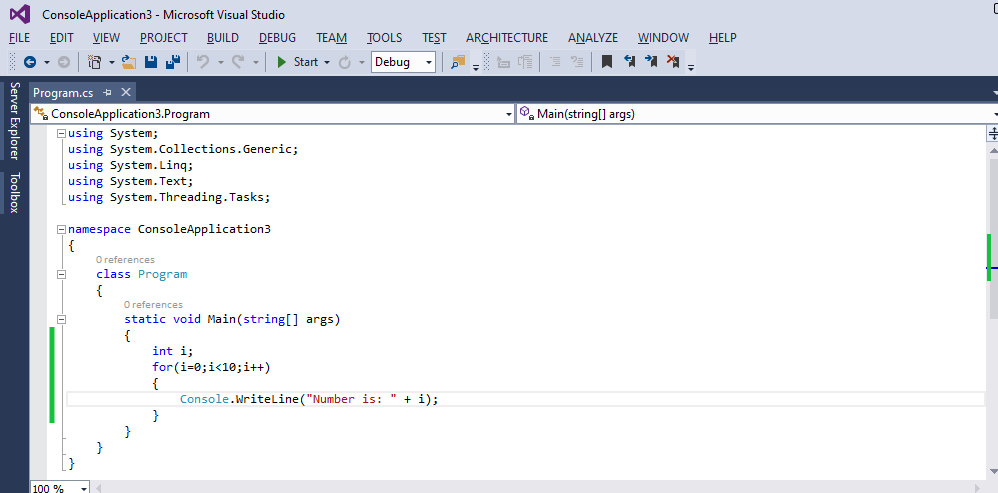
Output
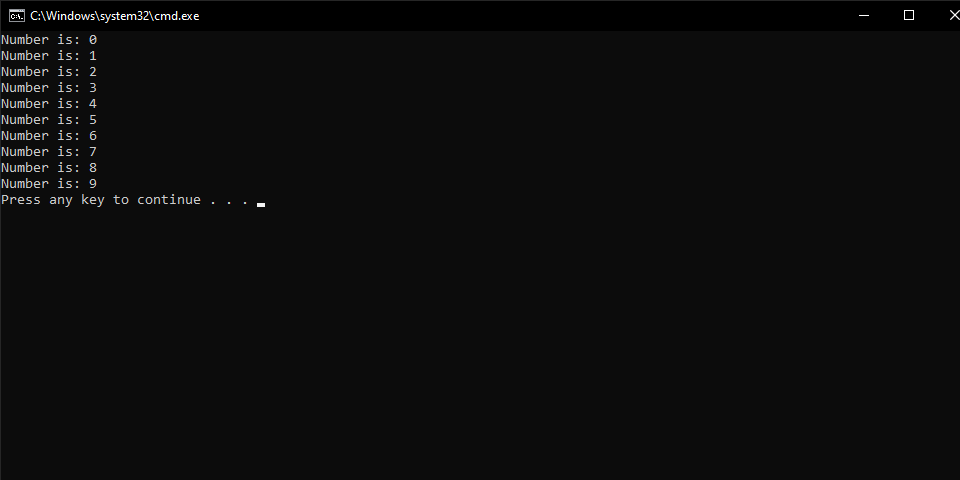
2. Decrement Operations Using For Loop
In this example, I will show you how to perform decrement operations using C# for loop. Here we have declared i=10 and decrementing it by 1 every time loop runs using i-- operator till i becomes i=1. This loop will stop when the condition of i>1 satisfies where the value of i cannot go less than 2.
using System;
using System.Collections.Generic;
using System.Linq;
using System.Text;
using System.Threading.Tasks;
namespace ConsoleApplication3
{
class Program
{
static void Main(string[] args)
{
int i;
for(i=10;i>1;i--)
{
Console.WriteLine("Number is: " + i);
}
}
}
}
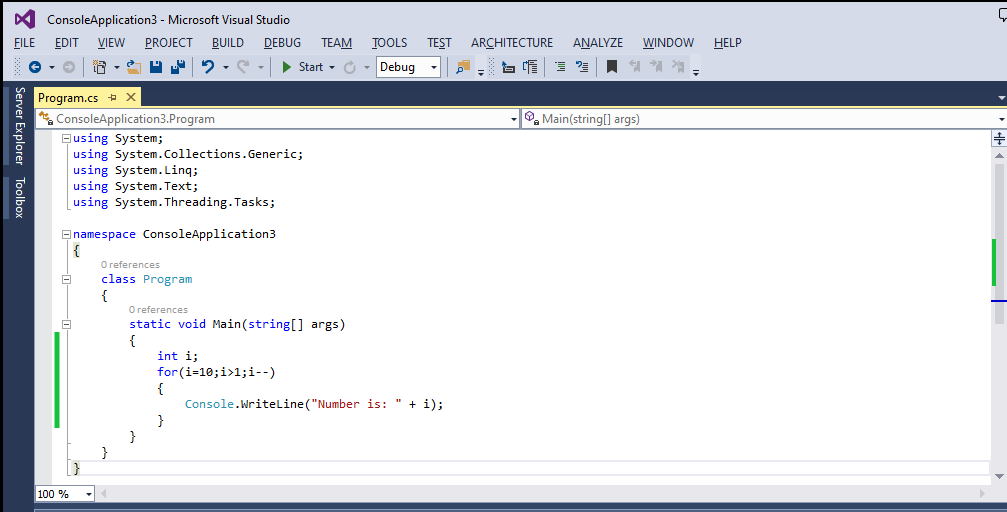
Output
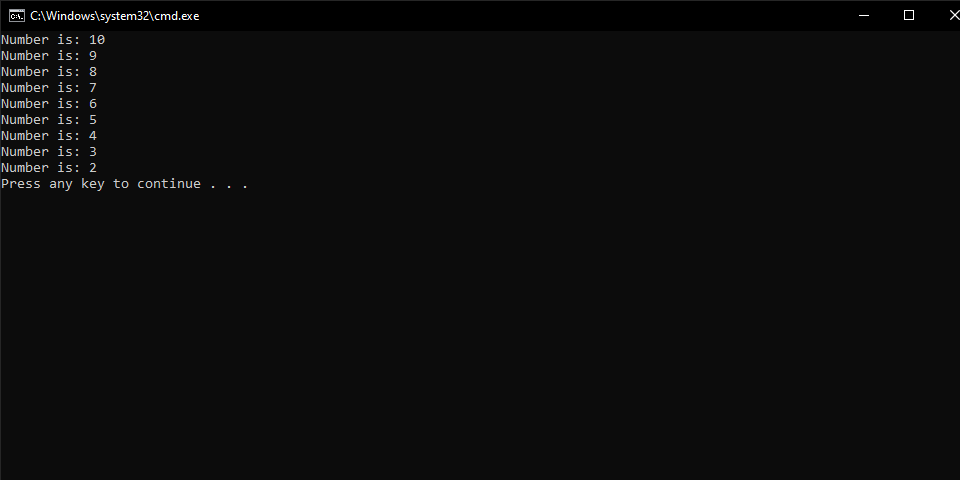
3. Addition Operations Using For Loop
In this example I will show you addition operations using C# for loop. I have used another variable sum and initialized it to 0. I have put condition sum +=2 which basically means sum = sum + 2. I am also running for loop here till i<10 condition satisfies. So every time for loop runs it add the previous value by 2 and shows the output. This happens 10 times as you can see in the below output.
using System;
using System.Collections.Generic;
using System.Linq;
using System.Text;
using System.Threading.Tasks;
namespace ConsoleApplication3
{
class Program
{
static void Main(string[] args)
{
int i;
int sum = 0;
for(i=0;i<10;i++)
{
sum += 2;
Console.WriteLine("Sum of Number is: " + sum);
}
}
}
}
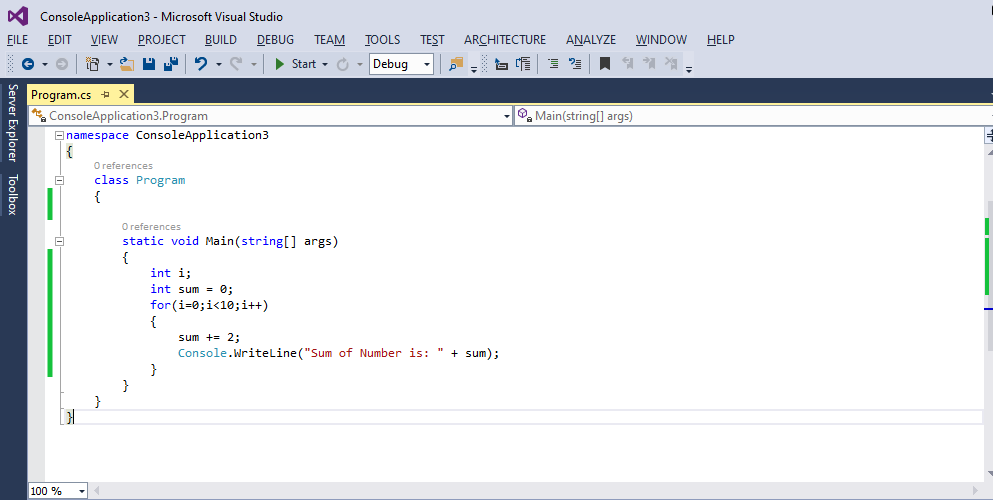
Output
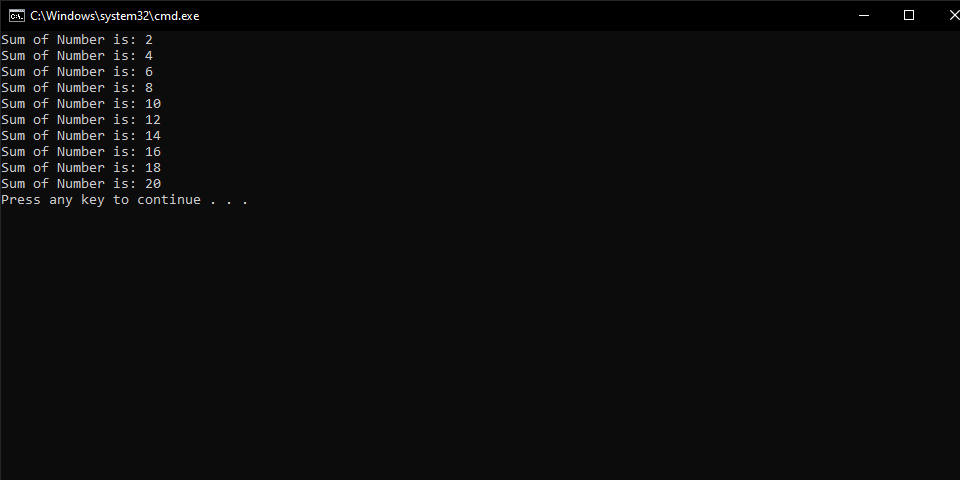
4. Subtraction Operations Using For Loop
In this example, I will show you about subtraction operations using C# for loop. Similarly, as previous example I have used a variable sub and initialized it to 10. Using the condition sub -= 2 which basically means sub = sub - 2, every time loops runs it will decrease the output by 2.
using System;
using System.Collections.Generic;
using System.Linq;
using System.Text;
using System.Threading.Tasks;
namespace ConsoleApplication3
{
class Program
{
static void Main(string[] args)
{
int i;
int sub = 10;
for(i=0;i<10;i++)
{
sub -= 2;
Console.WriteLine("Subtraction of Number is: " + sub);
}
}
}
}
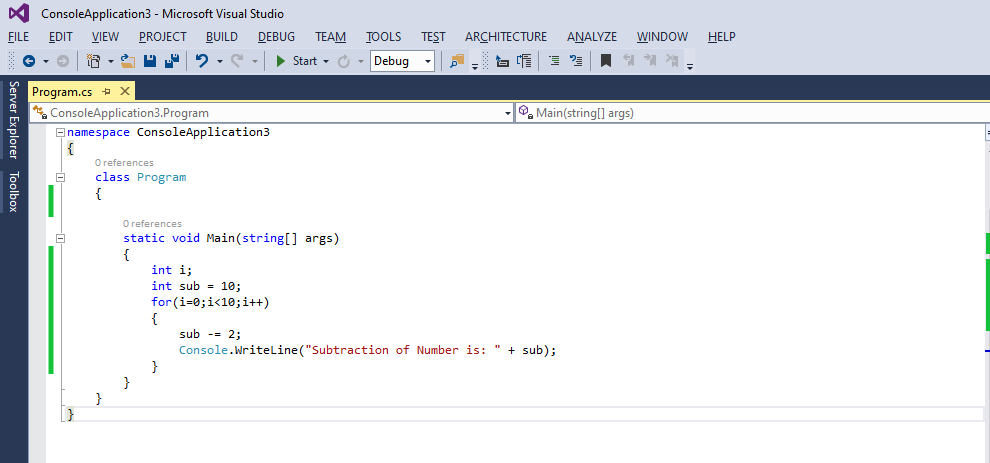
Output
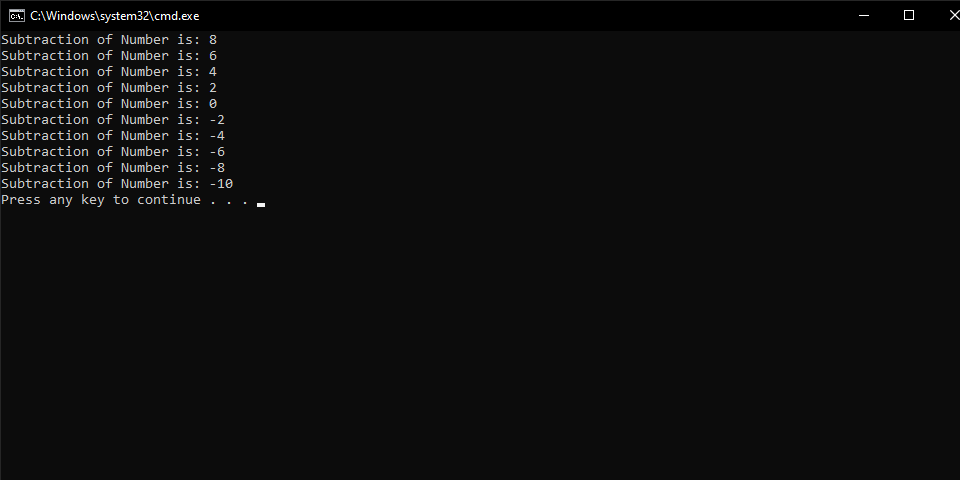
5. Multiplication Operations Using For Loop
In this example I will show you multiplication operations using C# for loop. I have used a variable mul and initialized it to 1. Here we have used the logic mul *= 2 which means mul = mul * 2. You might know star(*) means multiplication operations. We are looping this logic till i < 10 hence it will run 10 times since it starts from i=0 as you can see in below program.
using System;
using System.Collections.Generic;
using System.Linq;
using System.Text;
using System.Threading.Tasks;
namespace ConsoleApplication3
{
class Program
{
static void Main(string[] args)
{
int i;
int mul = 1;
for(i=0;i<10;i++)
{
mul *= 2;
Console.WriteLine("Multiplication of Number is: " + mul);
}
}
}
}
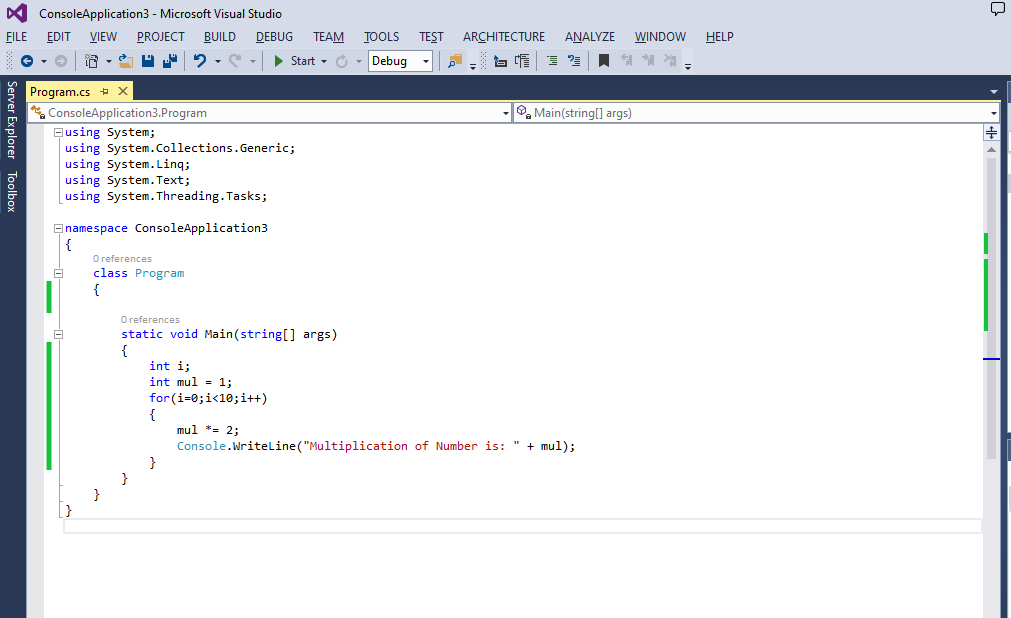
Output
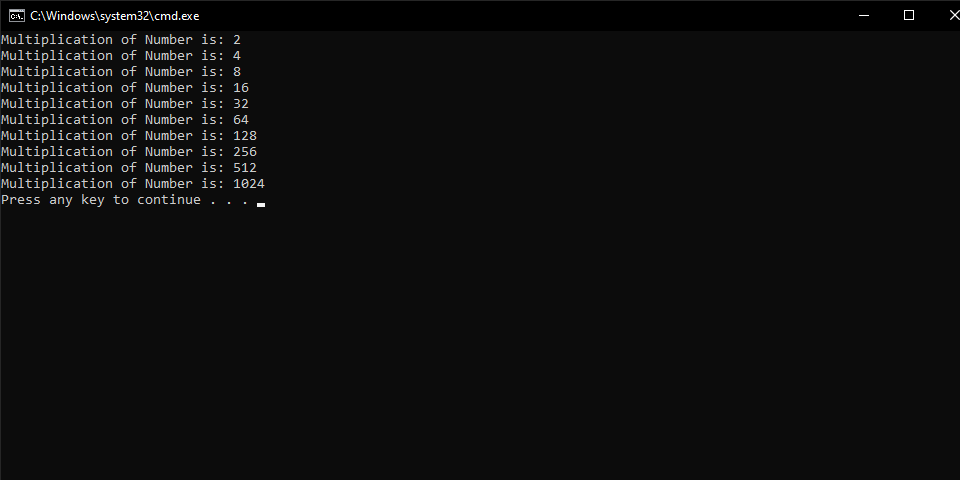
6. Division Operations Using For Loop
In this example, I will show you division operations using C# for loop. Here I have initialed a variable div = 1024 and used the logic div /= 2 which means div = div / 2. So every time loop runs, it will divide the output by 2. Here also loop will run 10 times as it is started from i=0.
using System;
using System.Collections.Generic;
using System.Linq;
using System.Text;
using System.Threading.Tasks;
namespace ConsoleApplication3
{
class Program
{
static void Main(string[] args)
{
int i;
int div = 1024;
for(i=0;i<10;i++)
{
div /= 2;
Console.WriteLine("Division of Number is: " + div);
}
}
}
}
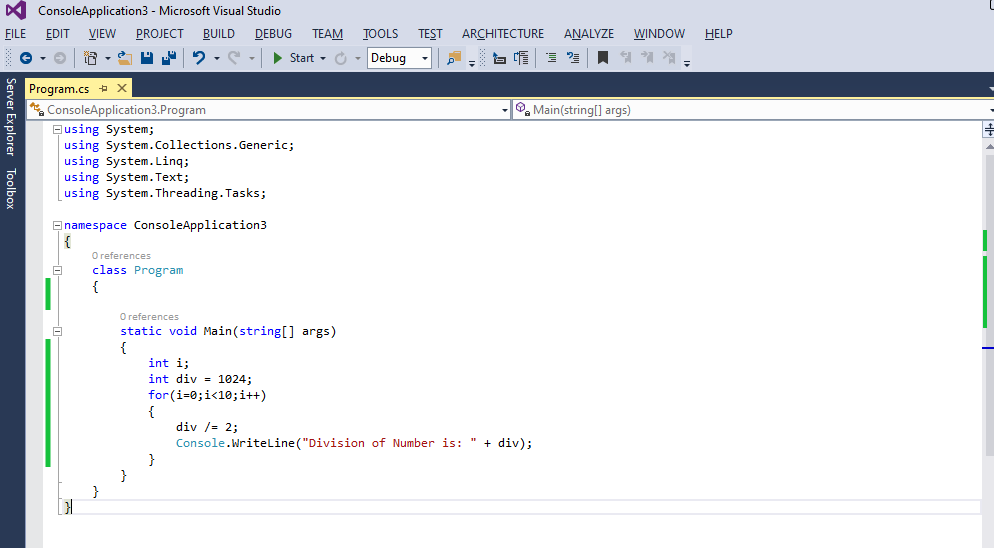
Output
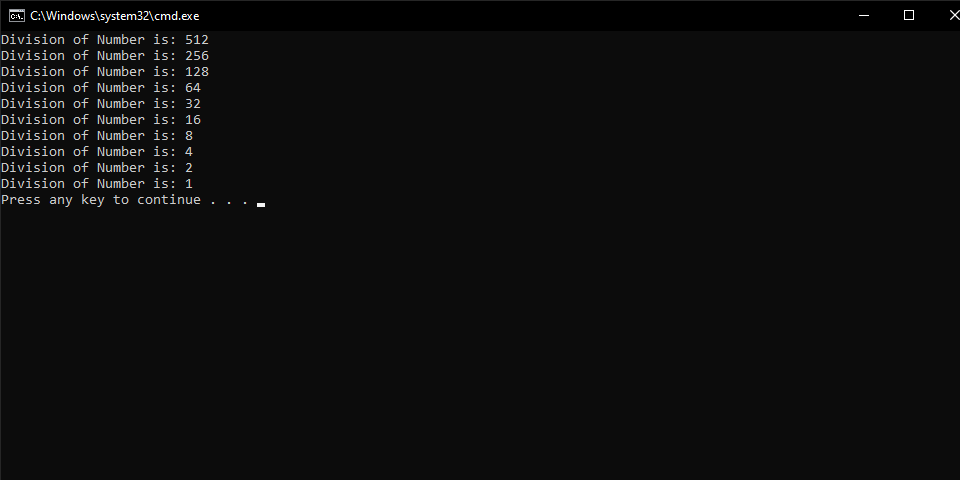
References: C# Programming Guide
